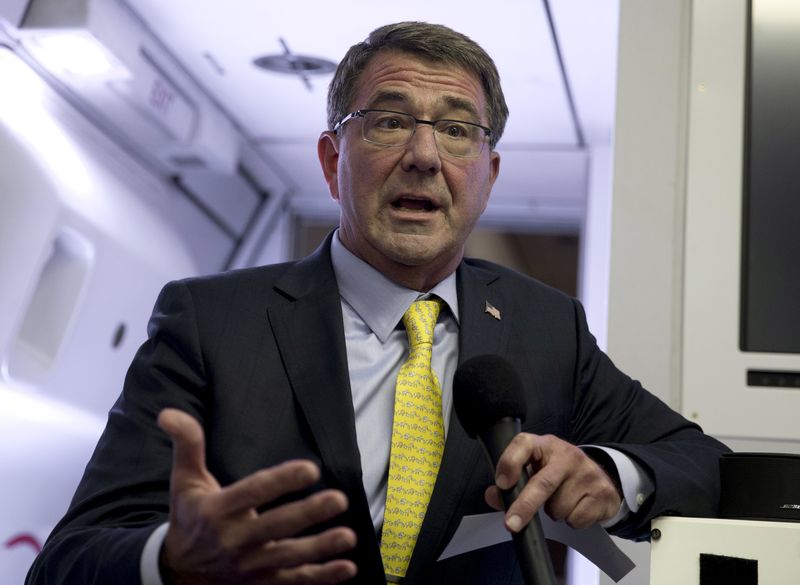By Phil Stewart
BAGHDAD (Reuters) - U.S. Defense Secretary Ash Carter made a surprise visit to Baghdad on Thursday to assess the campaign against Islamic State, as Iraq advances plans to retake the fallen capital of Sunni-dominated Anbar province.
Carter, on his first visit since taking up his post in February, said he would meet U.S. commanders as well as Iraqi political leaders, including Prime Minister Haider al-Abadi.
His unannounced visit coincides with attempts by Iraqi forces to lay the groundwork for a decisive push to recapture Ramadi, isolating the city with help from U.S.-led air strikes ahead of a full offensive.
Islamic State seized Anbar's capital, Ramadi, two months ago, extending its control over the Euphrates valley west of
Baghdad and dealing a major setback to Abadi and the U.S.-backed
army he entrusted with its defense.
Carter, who has criticized Iraqi forces for lacking a will to fight in Ramadi, said he sought to form "my own on-the-ground
assessment of the campaign" against the Sunni militants.
His first stop was the Iraqi Counterterrorism Service Academy, where he watched CTS soldiers in all-black uniforms firing at silhouette targets. He praised the elite Iraqi forces and lamented their battlefield casualties.
"Your forces have performed so very well, so very bravely," he said, voicing confidence that the Islamic State would ultimately be defeated.
The loss of Ramadi was the Iraqi army's worst defeat since
Islamic State militants swept through north Iraq last summer.
The onslaught further exposed the shortcomings of Iraq's
mainly Shi'ite forces and Iraq's dependence on Shi'ite militia, some with ties to Iran. It also raised questions about the ability of the Shi'ite-led government in Baghdad to overcome the sectarian divide that has helped fuel the Islamic State's expansion in Anbar.
SUNNI TRIBES
U.S. President Barack Obama responded last month by ordering
450 more U.S. troops to set up at Taqaddum base, which is closer
to the fighting in Anbar province and only about 15 miles
(25 km) from Ramadi.
One of the goals of a new U.S. deployment to Taqaddum is to
encourage Sunni tribes to join the battle against Islamic
State, complementing efforts at the Ain al-Asad air base, also in Anbar.
A Pentagon spokesman estimated that as many as 1,800 Sunni
recruits had been trained at Taqaddum since the base was set up.
The Sunni forces will help secure terrain but are not expected to lead any advance into Ramadi, something that could happen within the next two months, depending on Iraq's own assessments, the spokesman said.
The United States estimates there are about 1,000 to 2,000 Islamic State fighters in Ramadi, the spokesman said.
Shi'ite militia commanders, who have led much of the fightback in Iraq against Islamic State over the last 12 months, have said their initial focus is not on Ramadi but the nearby city of Falluja, under insurgent control for more than a year and a half.
Carter said he would also meet Sunni leaders during his
trip to Iraq, noting Sunni participation in the campaign would
be critical to its success.
A senior U.S. defense official said Iraq had shown some
"positive momentum" in its engagement with Sunnis in the past
months. Carter aimed to build on it, the official said.
Anbar's dominant Sunni population resented former Prime

Minister Nuri al-Maliki's government, which it accused of promoting Shi'ite interests and suppressing Sunnis.